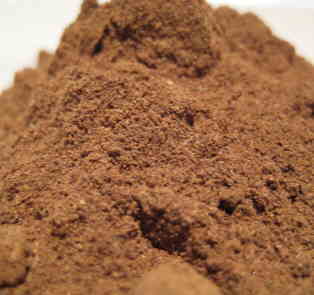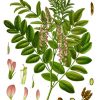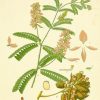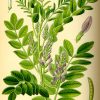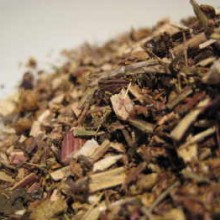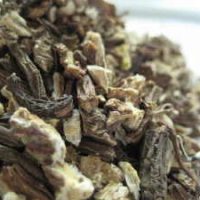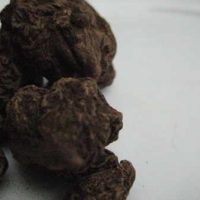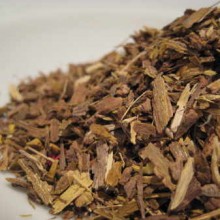Powdered Liquorice Root or licorice is the root of Glycyrrhiza glabra, from which a sweet flavour can be extracted. The liquorice plant is a legume (related to beans and peas) and native to southern Europe and parts of Asia. It is a herbaceous perennial, growing to 1 metre in height, with pinnate leaves about 715 centimetres (36 inches) long, with 917 leaflets. The flowers are 0.81.2 cm (1/3 to 1/2 inch) long, purple to pale whitish blue, produced in a loose inflorescence. The fruit is an oblong pod, 23 centimetres (about 1 inch) long, containing several seeds.
Culinary Uses of Powdered Liquorice Root:-
Liquorice flavour is found in a wide variety of liquorice sweets. The most popular in the United Kingdom are very sweet Liquorice allsorts. In continental Europe, however, far stronger, saltier sweets are preferred. It should be noted, though, that in most of these sweets the taste is reinforced by aniseed oil, and the actual content of liquorice is quite low. Additionally, liquorice is found in some soft drinks (such as root beer), and is in some herbal teas where it provides a sweet aftertaste. The flavour is common in medicines to disguise otherwise unpleasant flavours.
Liquorice Root is popular in Italy, particularly in the South, in its natural form. The root of the plant is simply dug up, washed and chewed as mouth-freshener. Throughout Italy unsweetened liquorice is consumed in the form of small black pieces made only from 100% pure liquorice extract; the taste is bitter and intense. In Britain and The Netherlands, dried liquorice root is chewed as a sweet.
Chinese cuisine uses liquorice root as a culinary spice for savoury foods. It is often employed to flavour broths and foods simmered in soy sauce.
Other herbs and spices of similar flavour include Anise, star anise, tarragon, and fennel.
Medicinal Uses of Powdered Liquorice Root:-
Liquorice root is an effective expectorant, and has been used for this purpose since ancient times, especially in Ayurvedic medicine where it is also used in tooth powders. Modern cough syrups often include liquorice extract as an ingredient. Additionally, liquorice may be useful in conventional and naturopathic medicinal uses for both mouth ulcers and peptic ulcers.
Liquorice root is also a mild laxative. Large doses of glycyrrhizinic acid and glycyrrhetinic acid in liquorice extract can lead to hypokalemia and serious increases in blood pressure, a syndrome known as apparent mineralocorticoid excess. These side effects stem from the inhibition of the enzyme 11?-hydroxysteroid dehydrogenase (type 2) and subsequent increase in activity of cortisol on the kidney. 11?-hydroxysteroid dehydrogenase normally inactivates cortisol in the kidney; thus, liquorice’s inactivation of this enzyme makes the concentration of cortisol appear to increase. Cortisol acts at the same receptor as the hormone aldosterone in the kidney; thus, the effects mimic aldosterone excess, although aldosterone remains low or normal during liquorice overdose. Cortisol does not actually increase either; however, its activity in the kidney effectively increases due to the disabling of this enzyme. To decrease the chances of these serious side effects, deglycyrrhizinated liquorice (DGL) preparations are available.
Liquorice affects the body’s endocrine system. It can lower the amount of serum testosterone, but whether it affects the amount of free testosterone is unclear.
The disabling of similar enzymes in the gut by glycyrrhizinic acid and glycyrrhetinic acid also causes increased mucus and decreased acid secretion. Thus, liquorice may, in moderate amounts, soothe an upset stomach and is used as an aid for healing stomach ulcers.

